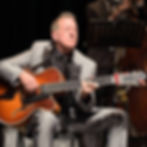Eddie Knew I Wasn't Practicing My Mel Bay
My first—and only—guitar teacher, Edward Decker, passed away this week. Eddie, as I called him, managed and owned Musically Yours, a music store in Rochelle Park, New Jersey.

Every musician goes through that phase where the musical passion burns brightly but the skills haven’t yet caught up. At that stage, the instrument feels more like a riddle than a tool: the strings buzz, the knobs confuse, and the balance feels awkward. That’s when a teacher becomes invaluable—someone to take that raw ambition and shape it into something coherent. But a teacher can only do so much; the practice is always up to the student.
For me, guitar was my first love, even though piano would later take center stage. Why guitar? Because, no matter how much I argue that Jerry Lee Lewis’ piano antics were foundational to rock and roll, we all know Chuck Berry’s riffs gave the genre its soul.
My mom, sensing my musical ambitions, took me to Victor’s House of Music in Ridgewood, NJ, where I picked out a 1989-1990 black-and-white Fender Strat—technically a Korean Squier II. Even now, I’m impressed by my own good taste as a kid. With a Peavey Rage amp, I was ready to play. But when I plugged it in, the sounds that erupted were anything but musical. I needed help.

Enter Eddie Decker. My mom brought me to Musically Yours, and I vaguely remember her talking to Eddie about lessons. I was a blank slate—no skills, but a spark of ambition. Eddie agreed to take me on.
We met weekly after school, and sometimes on Saturday mornings. He started with the basics: Mel Bay books and sight-reading exercises. I, however, was more interested in the pictures of guitars in the book than the dots on the page. My fingers clumsy, my mind wandered.
Man, was Eddie cool. He had quite a way about him—mussed up hair sticking in random directions, a few days of stubble, and a raspy voice that sounded like rock and roll. He did a really spectacular thing when he played, too: he would bend one foot to its side and put his other foot on top of it and tap one foot onto the other in time with the music. It was a sort of a mega foot tap: one foot does the tapping, but the other one moves in sync: foot tapping in stereo. I still do that quite often when sitting with my guitar today.
But Eddie’s coolness was paired with a seriousness that intimidated 12-year-old me. He wasn’t there to waste time, and neither was I—at least in theory. I spent most of my weeks listening to Beatles records instead of practicing Mel Bay exercises.
Eddie noticed.
One day, after I botched yet another exercise, Eddie looked me in the eye and asked, “Are you practicing this at home?”
“Yes!” I lied, trying to sound earnest. “But these exercises are boring. I don’t get what I’m playing.”
“What do you mean?” he pressed.
“They’re just notes. I can’t sing along or hear the rest of the music.”
Eddie paused, clearly puzzled. Here I was, questioning the fundamentals of guitar instruction without any real expertise to back it up. But I wasn’t trying to be difficult—I just wasn’t wired for rote drills. I wanted to make music, not regurgitate exercises.
“So, what do you like to listen to?” he asked, trying to see things from my perspective.
“The Beatles,” I said.
“What album?” he shot back.
He was surprised at my specific answer as I exploded at my favorite album of the moment, “The White Album.”
Eddie’s eyes lit up. He jumped from his folding chair and disappeared. A few awkward moments passed before he returned, holding a Beatles songbook identical to the one pictured below.

“‘Ob-La-Di, Ob-La-Da.’ You know that one?” he asked intensely.
“Sure!” I said, suddenly excited.
From that moment, everything changed. Instead of trudging through fretboard drills, Eddie taught me the chords to support the songs I loved instead of stumbling through the melody. For the first time, the guitar felt less like a mystery and more like a companion. “Do you know what a barre chord is, kid?” Eddie asked, and with that, I was off to the races.
Eddie didn’t just teach me how to play the guitar; he taught me about teaching itself. His willingness to adapt his methods to fit my learning style stuck with me and influences how I approach teaching in my own life today.
Eventually, I transitioned to piano, my true musical home. Eddie understood and even set me up with a piano teacher at the store. After a few weeks, I had absorbed enough chord knowledge from that teacher to translate what Eddie had taught me on guitar into piano. It was all the formal musical training I ever needed—or wanted.
The building that housed Musically Yours was hit by NJ Transit bus a few years after I stopped taking lessons. The store relocated to Hackensack, and Eddie was even featured in a local newspaper article about revitalizing the downtown area. I walked past the new location a few times, debating whether to go in and say hi. I never did, assuming he wouldn’t remember me.
Eddie Decker gave me more than music; he gave me an understanding of its seriousness, its beauty, and its demands. Music - or, any art for that matter - isn’t easy—it’s a craft, a discipline, and sometimes, a struggle. But for those willing to put in the work, it offers a reward unlike anything else.
Unlocking that mystery isn’t for everyone. Eddie didn’t sugarcoat it. I’m grateful that he trusted me enough to find a way to give me the keys.